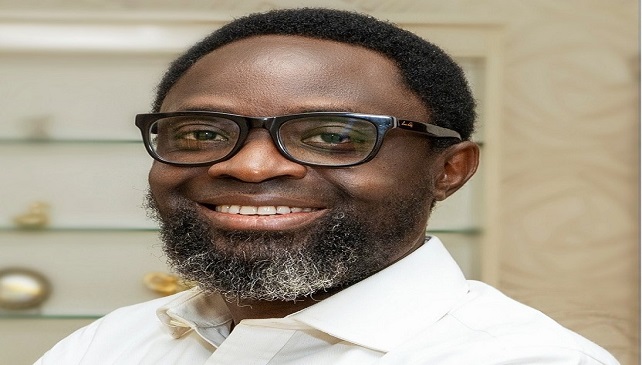News
Pantami says Digital Innovation and Entrepreneurship Centre will Fast-track the Implementation of Start-up Bill

Prof. Isa Ali Pantami, the Minister of Communications and Digital Economy, has expressed optimism that the National Digital Innovation and Entrepreneurship Centre once completed would fast-track the implementation of the Nigeria Start-up Bill, as he described the ongoing construction project as satisfactorily on course.

Prof. Pantami made this known after an-on-spot inspection of the site.
While noting that the project which is being executed by the National Information Technology Development Agency (NITDA) under the supervision of the Federal Ministry of Communications and Digital Economy is the hallmark of remarkable partnership between the visionary administration of President Muhammadu Buhari and a wholly indigenous yet forward looking company – Cosgrove Investment Limited, the Minister averred that the Centre which sits on 1,596sqm of built-up space within the FCT City Centre and comprises of two towers connected across one floor will be the hub for incubating and executing NITDA’s mandate.
“I have visited most of the floors of the National Digital Innovation and Entrepreneurship Centre; there are two buildings that are interconnected, one of them will serve as the actual National Digital Innovation and Entrepreneurship Centre as approved by the Federal Executive Council (FEC) after my presentation at the 11th of November, 2020 while the second one will serve as the Headquarters of the National Information Technology Development Agency to manage the other centre”.
“I’m very comfortable with what I have seen here and I came to the facility because it is our responsibility to ensure that any approval by FEC under our supervision is being implemented according to agreement.
“I can confirm to you that all the specifications of the project are in alignment with what the Council had approved twice, in November, 2020 and April, 202”, Pantami assured.
The Minister who was accompanied by the Director-General of NITDA, Kashifu Inuwa CCIE during the inspection at different times engaged the engineers on site and company officials in talks relating to the execution, as he commended the DG, Board and management of NITDA for the progress achieved with emphasis on the quality of the job done so far.
Pantami who later briefed journalists on the Pros and Cons of the facility, informed the press that Twelve Billion Naira (12BN) inclusive of VAT and other taxes is the total sum allotted to the project.
“The project was first approved in Nov, 2020 at the price of around 9.56BN and the augmentation which is an extension of the project was approved in April 2021 with additional N2.5B”.
“To be honest, I applaud the judicious way and manner NITDA has been handling the execution of the task, because if it were another institution, the total sum would have been double of it before it would have been executed”, Pantami maintained.
Although the completion date as approved by FEC is thirty-six months, spanning from November 2020 to 2023, Prof. Pantami however said haven taken into cognisance the fact that it is a legacy project of the present administration, the ministry was able to engage the project managers and contractors to speed up the completion timeline in order ensure that Mr President Inaugurates it before the expiration of his tenure.
The Communications and Digital Economy Boss took time to elucidate the benefits of the centre which he said was an idea he conceptualized when he was the Director-General of the National Information Technology Development Agency NITDA and is pleased to see it gradually coming to a reality.
He highlighted the fact that the building will play a significant role in implementing the Nigeria Start-up Bill which was recently passed by the National Assembly and assented to by President Muhammadu Buhari.
“The floors of the building will be dedicated to trainings, particularly hands-on-training, which will enable our young innovators to harness their skills and hatch their ideas from conception to impact”.
“This is going to be the centre where we will coordinate the issue of tax holiday for the innovators, pioneer status, intellectual property among many other benefits.
“More so, we are looking at consolidating on the diversification drive of the Federal Government; by implication, the regulator of Information Technology (IT) has a critical role towards the consolidation of the economic diversification that we have unarguably attained”, Pantami stressed.
NITDA Kashifu Inuwa CCIE, the Director-General of who was full of appreciation to the Minister of Communications and Digital Economy, Prof Isa Ali Pantami for his leadership and support to the Agency from inception of the project, getting approvals to where it is, recalled that the project was conceptualized in 2020 to strengthen the Abuja ecosystem.
Inuwa said the edifice will draw in start-ups, investors, multinationals, and government to be in the one space where discussions to move the digital economy forward will be sustained.
“We are hoping to finish this project within two years. Though it is not am easy task but we are working day and night to ensure we meet the expected quality and early delivery of the facility by March 2023 as partial completion will not be accepted”, Inuwa noted.
The DG also expressed gratitude to the Minister for okaying the involvement of an indigenous company in executing the job.
The 4,000 sqm plot for the Entrepreneurship and Digital Innovation Centre, located at plot 1409, CBD Cadastral zone sits the 2-tower edifice; an office complex and a mixed-use building going up to seven and eight suspended floors, respectively
The two towers are linked at all levels, for an overall area of 1,500 sqm and a total of 9 levels (from basement to roof terraces is to be the digital and innovation hub for the National Information Technology Development Agency (NITDA)
The building accommodates offices and meeting rooms (front tower), parking, auditorium, server rooms, a fab-lab and studio apartments (back tower)
The offices are designed for 9 departments and can accommodate over 360 staff
It is hoped that the ICT sector which as reported by the National Bureau of Statistics (NBS), played a pivotal role in lifting the Nigerian economy out of recession, recording the highest growth rate in the 4 Quarter of 2020 (14.70%), and recorded 15.9% growth in the telecommunications sub-sector (the highest growth rate over the last decade) as well as unprecedented generation of over N1Trillion revenue in less than 2 years by the Ministry and its parastatals will be continue to grow exponentially especially as the centre upon completion is expected to offer increased digital trainings to Nigerians.
News
New Study Reveals How Moniepoint Powers Nigeria’s Downstream Oil Sector with Same-Day Settlements and Working Capital Boost

In a move to strengthen Nigeria’s downstream oil and gas sector, Africa’s all-in-one financial platform for businesses and their customers, Moniepoint Inc. says it is transforming how petrol stations across the country manage payments, access credit, and track inventory through innovative financial solutions.

As the largest distribution network for financial services in Nigeria, the leading banking and payments platform trusted by million in its latest case study titled, “Fueling the Nation: How Moniepoint Powers Nigeria’s Oil and Gas Industry”, reaffirmed its commitment to providing digital payment solutions and business management tools to improve operational efficiency in Nigeria’s downstream sector.
The study released recently examined how petrol stations play a crucial role as vital distribution points for fuel in Nigeria, especially in areas with limited access to alternative energy sources. Over 90 per cent of passenger and freight movement in Nigeria is by road, literally fueled by petrol stations that facilitate an average of 41 to 47 million litres of petrol every day.
The downstream oil and gas sector has been considered as the lifeblood of the Nigerian economy, however, for decades, petrol station operators have grappled with the “T+1” settlement cycle, where funds from card payments are only accessible the next day. In an industry with razor-thin margins and the need for immediate restocking, this delay often leads to “dead tanks” and lost revenue.
According to the case study, Moniepoint has bridged this gap by introducing same-day settlements, ensuring that station owners can access their funds instantly to pay suppliers and keep pumps running. The report further reveals that 90.9% of petrol stations now utilize POS terminals as standard infrastructure, with digital channels accounting for 43% of all fuel payments nationwide.
The Moniepoint case study on Nigeria’s downstream oil and gas sector provides very insightful commentary on critical aspects of running a petrol station, including payment systems, inventory management, and funding challenges.
Giving insight into the report and its relevance to the nation’s energy segment, Managing Director, Moniepoint Microfinance Bank, Babatunde Olofin, noted that the study seeks to deepen policy engagement, provide actionable intelligence on critical success factors needed for the nation’s socio-economic growth across different verticals.
Olofin noted, “We are pleased to release this comprehensive report on Nigeria’s downstream sector. Moniepoint’s reason for being is to create financial happiness and power dreams. Reports like this move us in that direction, enabling us to support critical infrastructure that keeps the nation moving.
“Looking at the relevance, with data on their business transactions and our business management tools, petrol stations can effectively plan their inventory and availability, knowing exactly when to stock up and ensuring operations run smoothly to serve more customers.
“By providing fuel retailers with the financial tools they need, Moniepoint is creating a future where access to reliable fuel distribution is improved and represents more than a fundamental right for all in an equitable and efficient system.”
Some other Key insights from the report include: The Liquidity Gap: 1-in-3 station owners identify access to credit as their biggest recurring challenge.
Credit Success: Moniepoint has disbursed millions of Naira in working capital to the sector with a 99.81% repayment success rate.
These tools have enabled nearly three in five fuel stations nationwide to transition from cash-dependent, manually-operated businesses into digitally-enabled enterprises with reliable access to both payments’ infrastructure and growth capital.
This study by Moniepoint comes on the heels of others like the previous case studies on family-owned businesses, South-East’s Onitsha Market, community pharmacies, women-owned businesses, North-East agriculture and the definitive Informal Economy Report, which collectively demonstrated how digital payment solutions are transforming Nigeria’s commercial landscape across diverse sectors and market structures.
Moniepoint’s ongoing commitment to financial inclusion and economic development has positioned it as a catalyst for growth across Nigeria and beyond. The company processes billions in transactions monthly and continues to expand its reach, supporting millions of businesses with payments, banking, credit, and business management solutions.
News
FG Mandates Shared Funding for N1.98trn Electricity Subsidy

Federal Government has directed state governments to begin sharing the cost of electricity subsidy alongside the Federal Government.

It was gathered that payments for the subsidy will now be funded through the Power Assistance Consumers Fund (PCAF), a government-backed pool created to subsidise electricity bills for low-income and vulnerable consumers.
The fund is designed to replace blanket subsidies with targeted support, improve affordability amid rising tariffs and stabilise the power sector.
More than 18 states are already operating electricity regulatory agencies, while others are preparing to do so. The states include Lagos, Ondo, Osun, Ekiti, Edo, Delta, Bayelsa, Akwa Ibom, Cross River, Abia, Anambra, Imo, Kogi, Niger, Nasarawa, Plateau, Gombe and Jigawa.
The Director-General of the Budget Office of the Federation, Mr. Tanimu Yakubu, disclosed this in Abuja at the opening of the 2026 Post-Budget Preparation workshop on the Government Integrated Financial Management Information System (GIFMIS).
Speaking in an address read on his behalf by the Director of Expenditure Social, Mr. Yusuf Muhammed, Yakubu said states that enjoy the political benefits of electricity subsidy must also contribute to covering the financial gap created by the policy.
“Mr. President has directed that we operationalise a clearer framework to share the cost of electricity across the federation, so the burden is not treated as an open-ended fiscal residual — I mean federal residual,” he said.
“If you want a stable power sector, we must pay for the choices we make. When tariffs are held low, a gap is created. That gap is a subsidy, and a subsidy is a bill.”
He added: “In 2026, we will stop pretending that this bill can be left to the Federal Government alone, especially where the policy choice or the political benefit is shared across tiers of government.”
According to him, the President has ordered the activation of the electricity sector’s legal framework to ensure subsidy burden-sharing is practical and transparent.
“This means subsidy costs must be explicit, tracked and funded, so they do not return as arrears, liquidity crises or hidden liabilities in the market,” Yakubu said.
“It also means that if any tier of government chooses affordability intervention, the responsibility must be clear, agreed and enforceable. This is not punishment. It is an alignment.”
He further warned MDAs to make subsidy-related costs visible in their planning.
“The implication is simple: make subsidy-related costs visible in your planning and submissions. Do not push liabilities into the market as arrears or unfunded commitments,” he said.
Yakubu also disclosed that President Bola Tinubu has directed a review of Nigeria’s Fiscal Responsibility Framework to make fiscal rules more dynamic and enforceable.
“Fiscal rules are not a slogan; they are the guardrails of government,” he said.
“Without guardrails, spending becomes impulsive, debt becomes casual, and the budget becomes a statement of intent rather than a tool of delivery.”
He added that capital projects in 2026 must be delivery-ready and properly financed.
“A long list of projects is not a development strategy. It is often a map of disappointment. What citizens feel is delivery, completed roads, reliable power, functional schools and working hospitals,” Yakubu said.
Reacting to the development, the Director of Media and Communications of the Nigerian Governors’ Forum, Mr. Yunusa Abdullahi, said: “We are reviewing the context and content of the information. We will not be making further comments on it.”
News
Spain Bars Under-16s from Social Media in Digital Safety Crackdown

Spanish Prime Minister Pedro Sánchez has unveiled plans to ban children under 16 from social media platforms, mandating robust age verification systems as part of a sweeping legislative package to curb toxic online content.

Speaking at the World Government Summit in Dubai, Sánchez declared platforms must erect “real barriers that work” beyond mere checkboxes, shielding minors from the “digital Wild West” where they navigate unprotected.
The proposal, set for approval by Spain’s Council of Ministers next week, amends a draft bill in parliament and holds social media executives legally accountable for illegal content like disinformation, hate speech and child pornography.
The measures introduce tools to track harmful material spread, while criminalising algorithm manipulation that amplifies such content for profit.
“Spreading hate must come at a legal, economic and ethical cost platforms can no longer ignore,” Sánchez emphasised, vowing governments would stop turning a blind eye.
Spain joins Europe’s hardening stance on youth online access, mirroring Denmark’s under-15 ban plans from last fall, France’s push for restrictions by September, and Portugal’s new bill requiring parental consent for under-16s.
The moves signal a continental shift to “regain control” of digital spaces amid rising concerns over youth vulnerability.

 Telecom3 days ago
Telecom3 days agoTelecom Operators Invest Over $1Bn on 2,850 New Sites in 2025 – NCC

 E-Financial3 days ago
E-Financial3 days agoIf Capital is the Answer, What Exactly is the Problem with First Holdco

 E-Financial3 days ago
E-Financial3 days agoAmaanah Finance to Unveils Non-Interest Banking Services Today

 E-Financial2 days ago
E-Financial2 days agoAccidental Billionaire Opts for Jail Instead of Returning Money Credited Him by Mistake

 News3 days ago
News3 days agoNSCDC Hands over Fake Crypto Currency Trader to EFCC

 General News3 days ago
General News3 days agoFirst Trustees to Host 8th Islamic Estate Planning Clinic in Abuja

 News3 days ago
News3 days agoAlakija’s Flourish Africa Provides N300m Grants for Women Entrepreneurs

 News2 days ago
News2 days agoUS Set to Deport 79 Nigerians on Criminal List



























